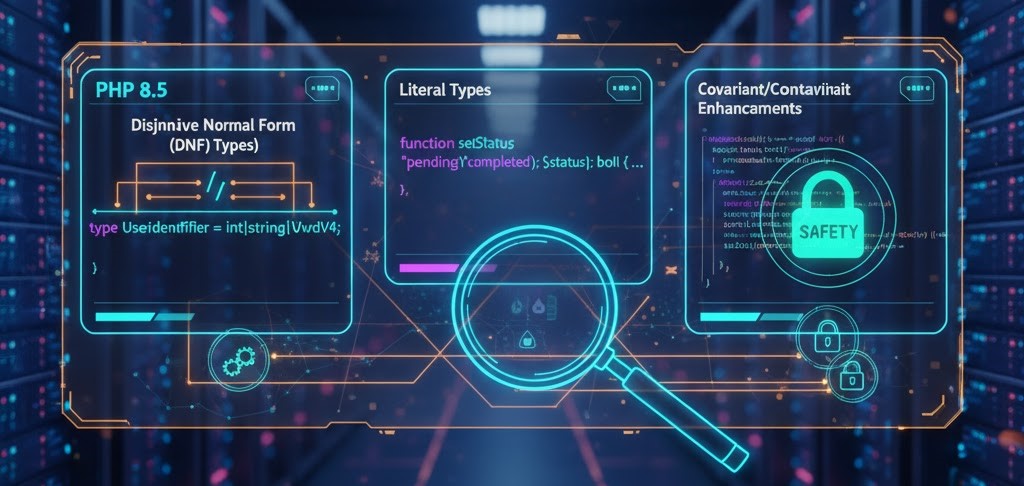Remember the days of PHP 5? Or even the leap to PHP 7, and then the steady stream of innovation through 8.0, 8.1, 8.2, 8.3, and 8.4? PHP, once perceived by some as a wild west of loosely-typed scripting, has matured into a sophisticated, high-performance, and incredibly robust language. It powers giants and humble blogs alike, continually evolving to meet the demands of modern web development.

Release Date: The official release of PHP 8.5 is scheduled for November 20, 2025. A series of alpha, beta, and release candidate versions were made available for testing throughout 2025 in the lead-up to the General Availability (GA) release.
Now, let’s cast our gaze into the near future. While specifics for PHP 8.5 are still brewing in the minds of core developers and in nascent RFCs, we can speculate, dream, and get incredibly excited about the trajectory PHP is on. What if PHP 8.5 delivered even more breathtaking performance, delightful developer ergonomics, and an even safer type system? Let’s explore the possibilities!
The Quest for Performance: Even Faster, Even Leaner
PHP has been on an incredible performance journey. From PHP 5.6 to 7.0, we saw massive gains, and each subsequent 8.x release has continued to chip away at execution times and memory consumption. For PHP 8.5, we’re not just hoping for marginal improvements; we’re envisioning breakthroughs that make PHP applications truly fly.
- JIT Compiler Enhancements: The Just-In-Time (JIT) compiler introduced in PHP 8.0 was a game-changer. For 8.5, we could see more advanced JIT optimizations:
- Deeper Code Analysis: Smarter decisions about which code to compile and how, leading to more aggressive and effective machine code generation.
- Profile-Guided Optimization (PGO): Imagine the JIT learning from actual runtime profiles of your application, identifying hot paths and optimizing them even further in subsequent runs.
- Specialized Call Optimizations: Better handling of frequently called internal functions or common library patterns.
- Memory Footprint Reduction: Efficient memory usage is critical, especially for microservices or high-traffic applications. PHP 8.5 might introduce:
- Refined Garbage Collection (GC): More intelligent collection cycles that free up memory faster without stalling execution.
- Optimized Data Structures: Core PHP data structures might be streamlined to consume less memory by default.
- “Cold Code” Optimization: Rarely executed code paths (e.g., error handling that rarely triggers) could be loaded or optimized differently, reducing the overall memory footprint without impacting common scenarios.

Developer Ergonomics: Writing Less, Doing More
While raw speed is thrilling, the daily lives of developers are often defined by how pleasant and efficient the language is to write. PHP 8.5 could bring a suite of features that make our code cleaner, more expressive, and reduce boilerplate.
1. The Enchanting Pipeline Operator (Hypothetical |>)
Imagine chaining operations in a way that reads left-to-right, much like a factory assembly line. This is the magic a pipeline operator could bring, making complex data transformations incredibly readable.
Current PHP (Pre-8.5):
$data = getDataFromSource($id); $sanitized = sanitizeInput($data); $processed = processData($sanitized, $config); $result = formatOutput($processed);
With Hypothetical PHP 8.5 Pipeline Operator (|>):
$result = $id
|> getDataFromSource() // $id is passed as the first argument
|> sanitizeInput() // Result of previous step is passed as first argument
|> processData($config) // $config is explicitly passed as a second argument
|> formatOutput();
This turns nested function calls inside out, dramatically improving readability for sequential operations.
2. Enum Enhancements: Beyond the Basics
Enums (introduced in PHP 8.1) have been a fantastic addition for type safety and expressiveness. PHP 8.5 could supercharge them further.
Auto-generated Helper Methods: What if declaring an enum automatically gave you isCase() methods?
enum OrderStatus: string {
case Pending = 'pending';
case Shipped = 'shipped';
case Delivered = 'delivered';
// Hypothetically, PHP 8.5 could auto-generate:
// public function isPending(): bool { return $this === self::Pending; }
}
$orderStatus = OrderStatus::Pending;
if ($orderStatus->isPending()) { // Cleaner than $orderStatus === OrderStatus::Pending
echo "Order is pending.";
}
Enum Interfaces & Traits: Allowing enums to implement interfaces or use traits could open up powerful patterns for shared behavior across different enum types.
3. Streamlined Read-only Properties
PHP 8.1 brought readonly properties, a big step for immutability. PHP 8.5 might refine this further, perhaps allowing assignment of readonly properties directly outside the constructor but only once, or during object initialization in a clearer way.
Current (8.1+):
class BlogPost {
public readonly string $uuid;
public function __construct(string $uuid) {
$this->uuid = $uuid;
}
}
Hypothetical (Slightly more flexible readonly): Imagine a final readonly (different from final class) for properties that are immutable after initial construction, even if assigned by a setter once.
class ImmutableConfig {
public readonly string $settingA;
public readonly string $settingB;
// Assigned in constructor as usual
public function __construct(string $a) {
$this->settingA = $a;
}
// What if settingB could be assigned once, later, but still read-only after that?
// (This would require a new keyword or semantic change, purely speculative)
// public function initializeSettingB(string $b) {
// if (!isset($this->settingB)) {
// $this->settingB = $b; // Assign once
// // } else { throw new LogicException("Cannot re-assign"); }
// }
}
Type System Evolution: Stronger, Safer, Smarter
PHP’s journey with typing has been remarkable. From optional type hints to strict typing, then Union Types, Intersection Types, and finally Disjunctive Normal Form (DNF) Types in 8.2 – the language has become incredibly expressive and safe. PHP 8.5 will undoubtedly continue this trend.
1. Expanded DNF Type Usages
While DNF types allow complex combinations like (A&B)|C, PHP 8.5 might expand their utility or simplify their declaration in more contexts. Imagine defining custom, reusable type aliases.
Current DNF (8.2+):
function processInput((string&InputInterface)|array $data) {
// $data can be an object that is both a string and implements InputInterface, OR an array
}
Hypothetical Type Aliases (Dream Feature):
// declare type UserId = int|string; // A developer's dream!
function getUserData(UserId $id): array {
// ...
}
This would dramatically improve code readability and maintainability for complex type signatures.
2. Literal Types: Precise Value Typing
Imagine being able to type-hint not just string but specific string values. This is what literal types could bring.
Current:
function setStatus(string $status): bool {
if (!in_array($status, ['pending', 'completed', 'failed'])) {
throw new InvalidArgumentException("Invalid status.");
}
// ...
}
With Hypothetical PHP 8.5 Literal Types:
function setStatus('pending'|'completed'|'failed' $status): bool {
// No need for explicit validation, type system handles it!
// ...
}
This would allow static analysis tools to catch errors even earlier and provide incredible type safety for configuration or state machines.
3. Smarter JIT Compilation
PHP’s JIT 3.0 engine is now context-aware, optimizing functions that actually need speed rather than blindly compiling everything.
<?php
function heavyMath($n) {
return array_sum(range(1, $n));
}
echo heavyMath(1000000);
?>
4. Async Programming via Fibers
PHP 8.5 refines Fibers, enabling the concurrent execution of independent code blocks. which is a significant leap toward asynchronous web applications.
$fiber = new Fiber(function() {
echo "Fiber Start\n";
Fiber::suspend("Paused");
echo "Fiber Resumed\n";
});
echo $fiber->start(); // Fiber Start
echo $fiber->resume(); // Fiber Resumed
5. Covariant/Contravariant Enhancements
While PHP has made great strides in enforcing covariance and contravariance in method signatures for inherited classes, there’s always room for further refinement, ensuring even more robust and predictable inheritance hierarchies. This leads to fewer runtime errors and more reliable interfaces.
The Road to PHP 8.5: From Idea to Reality
The exciting features we’ve discussed don’t just magically appear. They are the result of countless hours of discussion, debate, and meticulous coding by the PHP core development team and community contributors. The process typically follows this path:
- Idea & Discussion: A developer or group identifies a pain point or a potential improvement. Initial discussions happen on mailing lists, GitHub, or internal channels.
- Request for Comments (RFC): A formal RFC is drafted, outlining the problem, the proposed solution, its impact, and potential alternatives. This is where the community really gets involved in reviewing and providing feedback.
- Community Feedback: The RFC is open for discussion, and the community scrutinizes every aspect, often leading to refinements or entirely new approaches.
- Voting: Once an RFC matures, the PHP core developers (those with commit access) vote on its inclusion. A simple majority (2/3 for language changes) is usually required.
- Implementation: If the RFC passes, the real work begins: implementing the feature in the PHP source code.
- Testing: Extensive testing (unit, integration, performance) is crucial to ensure stability and catch regressions.
This democratic and rigorous process ensures that every new feature is well-thought-out, performant, and aligns with PHP’s overall direction.
Summary: What We Hope PHP 8.5 Brings to the Table
To encapsulate our dreams for PHP 8.5, here’s a quick overview of potential key improvements:
| Area of Improvement | Key Potential Features for PHP 8.5 (Speculative) | Primary Benefit |
| Performance | JIT Compiler Enhancements, Memory Optimization, Cold Code | Faster Execution, Lower Server Costs, Scalability |
| Developer Ergonomics | Pipeline Operator, Enum Enhancements, Read-only Refinements | Cleaner Code, Faster Development, Reduced Boilerplate |
| Type System | Literal Types, Expanded DNF Usage, Covariance/Contravariance | Safer Applications, Better Static Analysis, Predictable Code |

Embracing the Evolution
PHP 8.5, whenever it arrives, will undoubtedly be another significant milestone in the language’s journey. It will continue the tradition of making PHP faster, more developer-friendly, and more robust than ever before. It’s a testament to the vibrant and dedicated community that constantly pushes the boundaries of what PHP can do.
The future of PHP is bright, dynamic, and full of exciting possibilities. So, what features are you really hoping for in PHP 8.5? What change would touch your heart as a PHP lover? Could you share your thoughts in the comments below? Let’s dream together!


